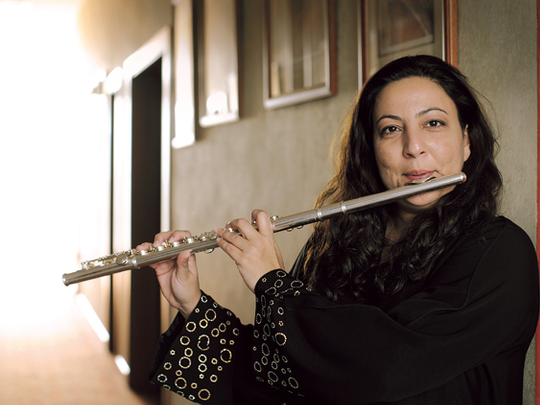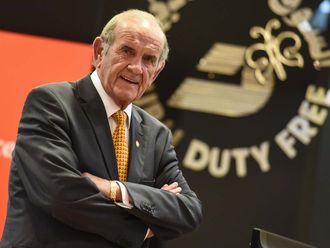
When Tom Cruise recently dubbed Dubai as being very ‘cinematic', and executed a few daring stunts around the Burj Khalifa during the filming of the Mission Impossible's fourth outing, The Ghost Protocol, the world watched in awe. For Dubai residents, it was a reaffirmation that their city is the glamourous, cosmopolitan, and happening 21st century destination it always has been. At once timeless and transient, this unique melting pot of tradition and uber-modern living has something to offer everyone.
On the face of it, the city is developingas a business hub, but that's not to say it's lagging behind on the cultural art scene. When one considers the huge number of nationalities that call Dubai their home, it is even more intriguing that the culture and traditions of all of these multi-ethnic groups is integral to the culture of this city too.
Emirati artists, musicians, entrepreneurs and film-makers have all been quick to learn and perfect influences from around the world, and are creating a visible ripple on the international art scene.
The endless literary, design, film and art initiatives on Dubai's social calendar are an acknowledgement of the role of literature and visual and performing arts in the social mileu. We met the artists who are truly spicing up the local art scene.
A woman of letters: Isobel Abulhoul, director, Magrudy's
She may well have arrived in the UAE way back in 1968, but there is always a zing and energy that surrounds Isobel Abulhoul and Magrudy's, the establishment she first founded with her Emirati husband in 1975!
An avid reader, Abulhoul was a schoolteacher before she started Magrudy's. She remembers Dubai as a "completely different world" when she first came here as a young wife. Today, Abulhoul, who is also founder of the Emirates Airline Festival of Literature, is upbeat about Dubai and its cultural growth over the years. Honoured with the Cultural Personality of the Year 2010 Award in October this year, she has also been nominated for the Emirates Woman of the Year 2010 Awards.
In her opinion, Dubai's appeal lies in the "vibrancy of the society and the openness of its people to visitors and expatriates". She is thrilled with the success of the literature festival she founded. "It's phenomenal - authors on the international circuit have come to love it just within a span of two years and ditto for the audiences. The rise in the number of our bookstores is testimony to the fact that there's a spurt in reading culture," she says. "I'm particularly excited to see the growth in Arabic books. We have tripled the shelves we devote to Arabic books - we are seeing a rise in good-quality originals as well as translated versions."
An ear for music: Tala Badri, musician and owner, Centre for Musical Arts
Tala Badri was just 17 when she made up her mind about what she wanted to do in life. With a passion for music, she was determined to choose it as her vocation. Unfortunately for the young Emirati, there were few music schools in the UAE at the time. She started young and could play the piano from the age of four, and the flute shortly after. Tala's enrolment in a British curriculum school ensured she had several opportunities to play music, although it was still unusual those days for an Emirati to play an instrument.
"My parents and my music teacher at the time were my mentors. At 17, thanks to the support of the Dubai Government I was awarded a full scholarship to study music in the UK. I went to Royal Holloway, University of London and graduated with a first class honours degree. To date, I am the only female Emirati music graduate," she says.
Keen that others like her should not have to face the same hurdles she had, Tala along with her husband who supported and championed her musical dreams, built a fully fledged music centre. It seems to have paid off - her daughter already plays two instruments. "Opportunities today are far greater than they were 20 years ago to learn and appreciate music," says Tala.
She also teaches students, in addition to overseeing the day-to-day running of her centre. She believes it is important to keep in touch with the developments in the teaching field, and admits that teaching music is so much more fun than sitting behind a desk!
A great believer in lifelong learning, Tala is today working on improving her saxophone skills, which according to her students has made her a more sensitive teacher, one whois aware of the problems involved in learning a new instrument.
Documenting art: Lamya Hussain Gargash, Emirati photographer
For 28-year-old Emirati photographer Lamya Gargash, just being able to say she is an artist, photographer and film-maker is perhaps the most liberating feeling, after growing up in an environment where fine arts were considered nothing more than ‘pastimes.'
Born and educated in Dubai and Sharjah, Lamya is an alumnus of the American University of Sharjah where she graduated with honours in 2000. She then went on to complete her studies in the UK, where she obtained her Masters in Art in Communication Design. She has participated in group exhibitions in Canada, Switzerland, the Netherlands, Japan, and France as well as within the UAE. Throughout her career, Lamya has won a number of awards for her work in films and photography. In 2004, Lamya bagged the first prize at the Emirates Film Festival, as well as Ibda'a Special Jury Award for her movie titled Wet Tiles.
Lamya looks at herself as a documentary historian of sorts, faithfully capturing a generation in transition. Her work frequently dwells on themes of identity, culture and the passage of time. Her latest exhibition, and an art book to accompany it, entitled Presence made waves. Lamya is most moved by the old quarters of Dubai, Sharjah and Ajman, where many houses were demolished to make way for development projects. While Lamya sees the demolition and new wave of construction as perhaps an "inevitable by-product of modernity and urbanisation", she believes it is essential to document what the times were like for posterity, and looks on herself as a sort of all-seeing narrator setting the record straight for her countrymen.
She adds that growing up in a Dubai that has been changing at a rapid pace has left many people of her generation feeling they are in a transitory time and place in their lives, hence the obsession with documentation.
A flair for films: Ali F. Mustafa, Emirati film maker
29-year-old Emirati film-maker Ali Mustafa, the man behind City of Life, has become synonymous with Dubai internationally and is certainly sitting smug today, with several accolades under his belt. He won the Best Emirati Film Maker at the Dubai International Film Festival in 2007, and three years later was adjudged Young Film Maker of the Year at the Digital Studio Awards 2010.
So, how does Mustafa rate his success and accompanying adulation, despite courting controversy through the film's making and the initial days of its launch?
"When I made City of Life no one really knew who I was... So they went to see a film about Dubai. Now it's different, people want to see Ali F. Mustafa's next film, so yes there is pressure."
Mustafa maintains that he wanted to correct the general perception that Dubai is a Disneyland of sorts through his film. "I wanted to address that we are not living in some amusement park or fairyland. I wanted the world to see Dubai as a real city like New York or London, with its good and bad sides, and that we are a confident people. I am proud of what Dubai has achieved in such a short time. I am proud of the vision that makes you want to get up and do something big for yourself too," he says, patriotism lighting up in his eyes.
A product of the London Film School, Mustafa wants to continue to make films as long as "God lets me".
To him the Emirati film-makers' presence at the regional film festivals is testimony to the fact that there is so much interest here.
"I think people like Hani Shaibani, Nawaf Al Janahi, Nayla Al Khaja and I started breaking new ground. We are making it easier for the new generation, but we are still trying to make it happen for ourselves as well."
Striking a chord: Salim and Abdullah Dahman, founders, Desert Heat hip-hop band
When Emirati brothers Salim and Abdullah Dahman watched the shocking images of 9/11 on their TV set, they could not imagine the trail of destruction that was soon to follow... "Desert Heat was born after the events of 9/11," says Salim. "We wanted to change people's perceptions about Arabs, while also explaining to the local youth that they should be proud of where they come from."
Their hip-hop group was formed in 2002, and soon became a sensation, which the brothers put down to the fact that there were not too many people in those days speaking to the Arab youth in a voice and manner they could listen to and identify with.
Salim became ‘Illmiyah' and Abdullah became ‘Arableak', and their first performance was at an audition in Dubai for popular musician Akon.
So well-received was their music, that Desert Heat was asked to be one of the opening acts for the launch of MTV Arabiain November 2007, alongside Akon, Ludacris and Karl Wolf.
While their music is essentially in English, the lyrics are peppered with Arabic words and phrases, and there is a dominantly Arabic flavour to their music.
They speak about the struggles and issues that Arab youth face today. Shortly after the MTV Arabia accomplishment, Desert Heat released its first video Keep It Desert and the debut album When The Desert Speaks released in 2008.
Abdullah says: "As far as Dubai audiences go, some people stare in amazement seeing us rapping, some clap and cheer and some just look confused. It's because they see rapping as an alien concept in the region."
Reflecting on the raison d'être for the group's existence, Abdullah avers that the band will always talk about the issues. "We consider ourselves the reporters, we take the issues put it in our music, so future generations can ‘feel' what was going on. Something like the art of Gustav Klimt and Claude Monet conveys to art lovers today."
Different strokes: Jalal Luqman, digital and mixed media artist
When Jalal Luqman, an animated and smiling artist with his twinkling eyes, promises that his work will take you out of your comfort zone, you cannot help but have a feeling of trepidation sweep over you.
Jalal Luqman, Emirati digital and mixed media artist, is confident that his work will not grace pretty dining rooms in houses, or lobbies of hotels in the region - at least for some time to come. And that scarcely bothers him as he fervently believes that art is about getting in touch with your emotions and expressing them any way you can.
"My work is loud, when you see my artwork it hits you hard, because it is not beautiful art, it is meaningful art, it is a reflection of our human emotions... so that is why people see my work as provocative," he reasons, refusing to be categorised by the myriad ‘angry young man' sobriquets people have given him.
Luqman prefers not to think of himself as belonging to a school of artists that paved and smoothed the way for a new generation of Emirati artists, because he says he consciously did no such thing.
"I worked at art because I wanted to, and yes it was very hard. Imagine introducing digital art to the UAE 21 years ago at a time when traditional art itself was not understood. Today I am happy that I was crazy enough to start that long back, because now art commands respect here, and all our hard work has been acknowledged as useful experience to pass on to the young generation," he says. F












